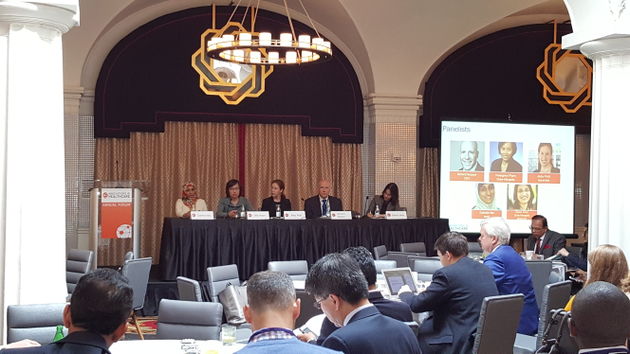Innovations in Healthcare hosted their 6th Annual Forum in March, in Washington, DC. It was a spectacular ensemble of innovators, entrepreneurs, network partners, funders, and corporates. For an event that lasted over two days, and with over 120 people in the room, there were plentiful opportunities built in to allow for networking and collaboration. With an intent to facilitate knowledge sharing and networking, most panels planned were designed to be uber-interactive, shining light on issues pertinent to the scale-up and growth of our network innovators and entrepreneurs – which now brings together 75 organizations across 50 Countries.
Innovations in Healthcare hosted their 6th Annual Forum in March, in Washington, DC. It was a spectacular ensemble of innovators, entrepreneurs, network partners, funders, and corporates. For an event that lasted over two days, and with over 120 people in the room, there were plentiful opportunities built in to allow for networking and collaboration. With an intent to facilitate knowledge sharing and networking, most panels planned were designed to be uber-interactive, shining light on issues pertinent to the scale-up and growth of our network innovators and entrepreneurs – which now brings together 75 organizations across 50 Countries.
I had the good fortune of moderating a panel titled “Seeing the Whole Picture: The Role of Policy & Advocacy in Healthcare Innovation”. Personally, having stood at the cross-roads of scale, while building my healthcare enterprise in India, the answers were not clear to my mind. It was a fine balance of capabilities, as one debated pure- vanilla private sector approaches to scale, or policy routes to influence impact at a much larger scale. Hence, using this platform, I invited the best-minds to debate these issues with me – Dr. Hoangmai (Mai) Pham, previously Chief Innovation Officer at the Center for Medicare and Medicaid Innovation (CMMI); Richard Rossow,Senior Adviser, and Wadhwani Chair in U.S.-India Policy Studies at Center for Strategic and International Studies (CSIS); Abby Pratt, Vice President, Global Strategy & Analysis, at Advanced Medical Technology Association; and Zubaida Bai, Founder and Chief Executive, ayzh joined me as panelists.
It was absolutely fascinating to learn from their unique perspective, outlining not only the challenges but also the opportunities within their spheres of influence. Mai spoke about the role of government in sparking healthcare innovation within the private sector, through models that align incentives formultiple stakeholders. Specifically sharing her experience of spearheading innovation within the US Healthcare Ecosystem, Mai shared key learnings while implementing alternative payment models within Medicare and CHIP Reauthorization Act (MACRA). Mai leveraged her platform at CMMI to design and test working models for accountable care organizations and advanced primary care, including the Pioneer and Next Generation ACO Models, Comprehensive Primary Care Initiative, and Comprehensive ESRD Care Initiative. Abby offered an international lens, as she spoke about key challenges facing the medical diagnostic industry across global markets such as India, Russia, the Middle East, Central and Eastern Europe markets. The geo-political & regulatory landscape wove a complex web of challenges that required custom-made addressal. Rick’s experience at CSIS leveraged his U.S. – India Interface expertise spanning over multiple decades. Rick presented his nuanced understanding of a complex emerging economy like India, specifically the role of a State Government vs. the Federal Government. His expertise in deciphering the political landscape, presented a unique opportunity to align the incentives of cross-border entities across a broad range of sectors. Zubaida, widely regarded as an expert and a leader in the field of engineering design for low-cost health products, shared her journey as a healthcare entrepreneur, customizing solutions towards providing access to Clean Birth Kits. At ayzh, they have not only leveraged public-private partnership as a route to scale, but also other government incentives, such as boasting local manufacturing, and promoting women empowerment.
The one thing that was quite clear at the end of the panel was that the answers are not straight-forward! As social enterprises explore opportunities to scale using the policy route, so do governments and policy-makers across the globe, looking to partner with the right opportunity that meets their development and economic growth goals!

